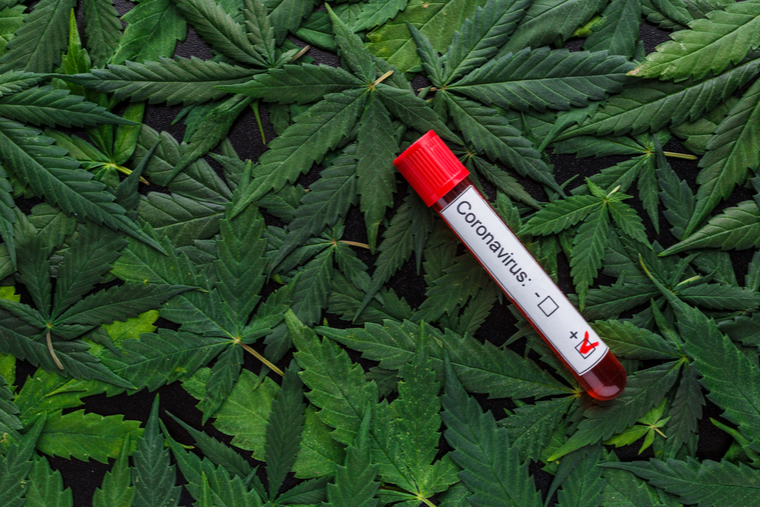Should doctors take particular care to talk to patients about the potential dangers of COVID-19 if those patients have a problematic relationship with pot?
New research from Washington University in St. Louis suggests perhaps they should.
Diabetes, obesity and a history of smoking cigarettes are all considered risk factors for poorer COVID-19 outcomes. Warnings and tailored information are targeted to people with these conditions, and doctors are acutely aware of the elevated risks they pose.
Findings from the lab of Ryan Bogdan, associate professor in the Department of Psychological & Brain Sciences in Arts & Sciences, suggests cannabis use disorder (CUD) should be added to the list because the genetic predisposition to CUD is overrepresented in people with poor COVID-19 outcomes. More work is needed to determine if there is direct causation.

The research is in press in the journal Biological Psychiatry: Global Open Science.
“As sociocultural attitudes and laws surrounding cannabis use become increasingly permissive, and COVID-19 continues to spread, we need to better understand how cannabis use as well as heavy and problematic forms of use are associated with COVID outcomes,” Bogdan said.
First author Alexander S. Hatoum, a postdoctoral researcher in the Washington University School of Medicine, used genetic epidemiological models to determine that genetic predisposition to CUD is related to risk for a severe reaction to COVID-19 (i.e., being hospitalized with COVID-19).
Hatoum combined existing datasets to test whether being at higher genetic risk for cannabis use disorder was correlated to the risk of COVID hospitalization. One set of data involved 357,806 people, including 14,080 with CUD; the other involved 1,206,629 people, including 9,373 who were hospitalized with COVID. He also looked at 7 million genetic variants to assess the association between CUD and severe COVID.
Having genetic variants does not mean a person has CUD or that the person has used cannabis.
In comparing people with the variants to their COVID outcomes, the researchers found genetic liability for CUD accounted for up to 40% of genetically influenced risk factors, such as body mass index (BMI) and diabetes, for a severe COVID-19 presentation. This association suggested that heavy and problematic cannabis use may represent a modifiable pathway to minimize severe COVID-19 presentations.
The results of this study point to two possible outcomes: That a predisposition to CUD and severe COVID-19 are due to a common biological mechanism, like inflammatory conditions causing individuals to develop worse symptoms of COVID-19 and/or dependence on cannabis; or that they are associated because of a causal process.
“If we know the genes that predispose individuals to cannabis use disorder, and if cannabis use disorder is a risk factor for COVID-19 hospitalization, you will see the genes influencing cannabis use disorder as predictors of severe COVID-19 cases,” Hatoum said. “We found that a person’s genetic risk for cannabis use disorder is correlated with their risk for COVID-19, without having to ask directly about illegal substance use.”
The genetic association between CUD and COVID-19 severity was similar in size to genetic correlations between COVID-19 severity and BMI, a well-known risk factor for severe COVID-19 presentations. Moreover, it was present even when accounting for genetic liability to BMI as well as other risk factors for a severe reaction to COVID-19, including metabolic traits (e.g., fasting glucose, hypertension); respiration traits (e.g., forced expiratory volume, COPD); socioeconomic status; alcohol and tobacco use; and indices of impulsivity.
“That the genetic relationship between CUD and COVID-19 is independent of these factors raises the intriguing possibility that heavy and problematic cannabis use may contribute to severe COVID-19 presentations. As such, it is possible that combating heavy and problematic cannabis use may help mitigate the impact of COVID-19,” Hatoum said.
“This information needs to be incorporated into any strategy to defeat this disease,” Hatoum said.
These data suggest that heavy cannabis users may have a more adverse reaction to COVID-19 and that, much like quitting tobacco smoking or reducing BMI, reducing and/or stopping heavy cannabis use may protect against severe COVID-19 reactions.
Julia Strait contributed to this story.



